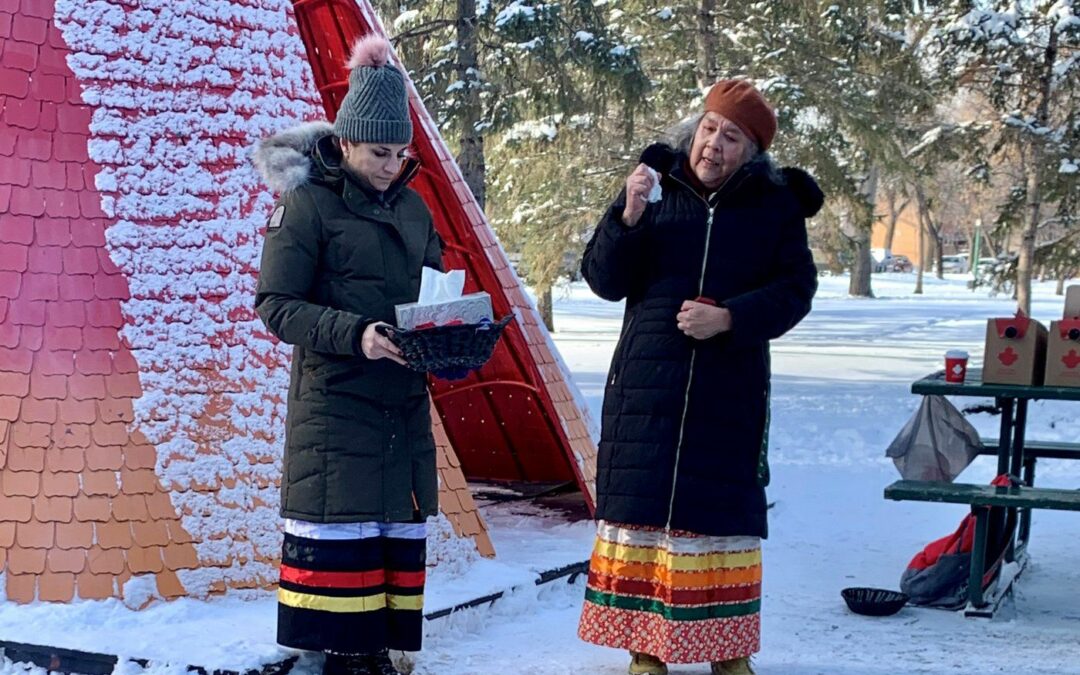By Dave Baxter, Local Journalism Initiative Reporter
It was an act of brutality that left a young Cree woman dead, and sparked a reckoning when it comes to how Indigenous people are treated and often mistreated by the criminal justice system.
Now on the anniversary of her death, those who knew Helen Betty Osborne say her legacy still matters today and they hope people never forget what happened to her when her life was taken more than 50 years ago on a cold November morning in northern Manitoba.
Osborne was just 19 years old in the early morning hours of Nov. 13, 1971, and around 2:30 a.m. that morning was walking down Third Street in The Pas, after spending a night out with friends.
Osborne’s life would soon be taken from her at the hands of four men who kidnapped and murdered her in brutal fashion, as she was beaten to death and stabbed more than 50 times with a screwdriver that morning, and was also found to have a broken skull and cheekbones from the attack.
Elder Rebecca Ross, who was a friend of Osborne’s before her death and said she was one of the last people to see her alive, spoke at a ceremony and Sacred Fire held at the Rainbow Butterfly Warming Hut in Kildonan Park in Winnipeg on Monday to mark the 51st anniversary of Osborne’s death.
She said she still thinks about the fact that Osborne was killed after doing nothing more than walking down the street that morning 51 years ago.
“She was taken away even though she never did any harm to anyone,” Ross said while holding back tears on Monday.
“She never in her life did any injustice to anybody and then she had this horrible injustice done to her, and she was just a young happy 19-year-old girl.”
And justice for what happened to Osborne came slowly and many believe it didn’t come at all, as it was not until December of 1987, sixteen years after her death, that one of the four white men involved in her death was convicted of a crime, and only one of those four men ever spent any time behind bars for the murder.
A long investigation by the Aboriginal Justice Implementation Commission said in their final report that racism and sexism had played a “significant” role in both the murder and in the response by police and the criminal justice system in the aftermath of Osborne’s killing.
The case was also one of the pillars, along with the 1988 killing of John Joseph (J.J.) Harper, to the Manitoba government undertaking the Aboriginal Justice Inquiry (AJI), which looked to “examine the relationship between the Aboriginal peoples of Manitoba and the justice system.”
Ross said she believes that the legacy of her friend needs to live on, because now more than five decades after Osborne’s death, she is still witnessing Indigenous women in this province fall victim to violent crime and murder.
“It’s been 51 years since we lost Helen Betty, and so much has happened since she left, and so many more women have been taken,” Ross said.
She added as she and others mourn for Osborne, she also hopes that her case and its aftermath will be a reminder to all Manitobans that a whole lot more needs to be done in this province to help keep Indigenous women and girls safe, and free from violence.
“As Indigenous people, we are going to act to protect our young women, and we are going to do it to honour Helen Betty,” Ross said. “This violence against women is not OK, and we’re not going to allow it anymore.
“Indigenous people have a voice, we have found our voice, and we’re going to use it to protect our women.”
(Top Photo: Elder Rebecca Ross, right, a friend of Helen Betty Osborne before her 1971 death, spoke at a ceremony and Sacred Fire held at the Rainbow Butterfly Warming Hut in Kildonan Park in Winnipeg on Monday to mark the 51st anniversary of Osborne’s murder. Dave Baxter/Winnipeg Sun/Local Journalism Initiative.)
